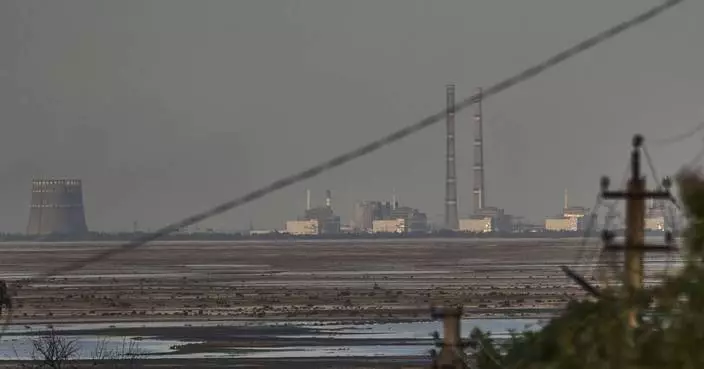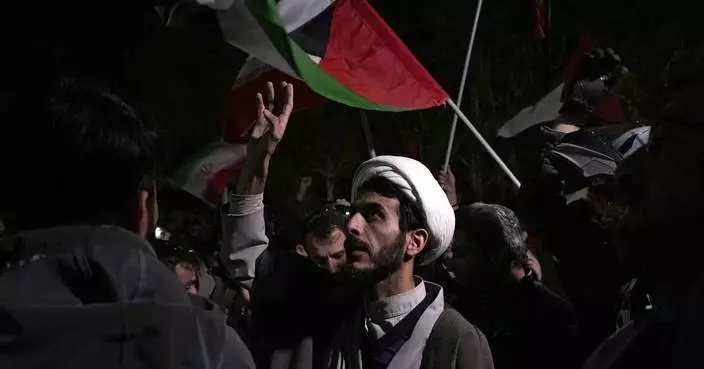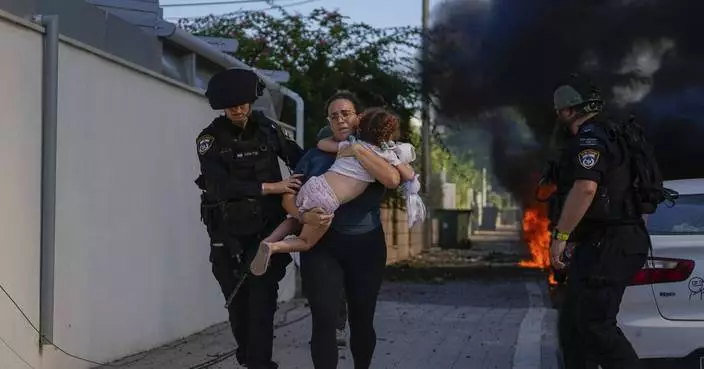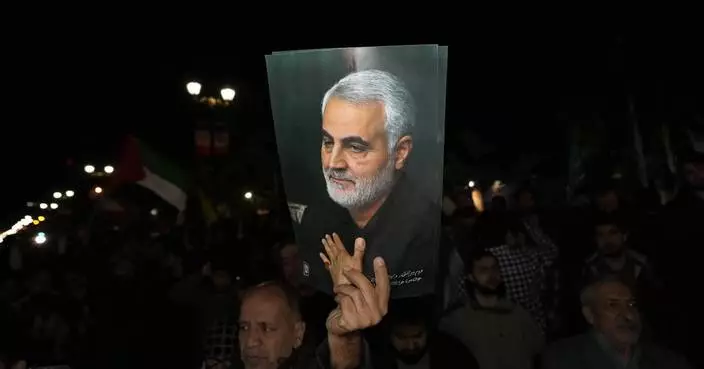Guardsman John Bogg was attacked by the animal during an early morning patrol in Kenya last October.
A guardsman who was savaged by a buffalo in Kenya was singled out by the Duke of Cambridge to recount his ordeal.
Guardsman John Bogg was deployed with the Irish Guards for a training exercise in October when he was attacked by a buffalo on high ground during an early morning patrol.
William immediately asked to speak to the 19-year-old during a visit to 1st Battalion at their barracks in Hounslow, west London, after a Saint Patrick’s Day parade.
Describing the ordeal, he told the Press Association: “I heard a grunting sound to my left and there was a figure built quite well, and I saw in the glint of the moonlight its horns, then it charged at us.
“Everyone ran to the left and I went to the right.
“It chased after me, flipped me with its horns, flew me about 10 metres further down, then it kept repeatedly butting me, about four or five times.
“My day sack saved me, otherwise I would have been impaled.
“Once it thought I was dead, finished, it gave me a final butt and ran off, trampled over me, so I was lucky to survive it. If it wasn’t for my day sack I wouldn’t be still here now.”
“One of the maddest experiences of my life,” he added.
Guardsman Bogg has been part of the Irish Guards for 18 months, and was deployed to the Falklands before Kenya.
The duke, described by the soldier as “very hands on” in his role as Colonel of the Irish Guards, visited the operation in Kenya last year but was not there when the incident occurred.
He later heard the story after it was passed up the army’s chain of command, and loudly asked: “Where’s Guardsman Bogg?” when he entered the dining room, where hundreds of soldiers were waiting to toast him.
The teenager said his name being called out was “completely unexpected”.
Shaking Guardsman Bogg’s hand, the men chatted for a few moments before William gestured quizzically to the rest of his comrades and asked about the role they played after he was attacked.
“They all ran off sir,” the teenager replied, prompting raucous laughter.
Moments earlier, the guardsmen banged on tables and cheered as they waited for the Duke and Duchess of Cambridge to arrive.
The couple later sipped pints of Guinness as hundreds of soldiers stood to toast them.
Describing their meeting, Guardsman Bogg said: “He said it was unbelievable that I was still here and he’d heard about it, and asked me how the buffalo attacked me. And then Kate was just asking what had happened.
“The interaction in Kenya, coming out and seeing us – I don’t think every regimental colonel does that. I think you’ve got to be one in a million to do that to be honest with you.”
He added: “To think that he’s chosen me out is quite special to honest with you, especially for someone that high up to hear about such an incident, it’s brilliant.”
JERUSALEM (AP) — Israel’s military chief said Monday that his country will respond to Iran’s weekend attack, but he did not elaborate on when and how as world leaders urged against retaliation, trying to avoid a spiral of violence in the Middle East.
The Iranian attack on Saturday came in response to a suspected Israeli strike two weeks earlier on an Iranian consular building in the Syrian capital of Damascus that killed two Iranian generals. It marked the first time Iran has launched a direct military assault on Israel despite decades of enmity dating back to the country’s 1979 Islamic Revolution.
Iran launched hundreds of drones, ballistic missiles and cruise missiles at Israel in the attack. The Israeli military said that 99% of the drones and missiles were intercepted, by Israel's own air defenses and warplanes and in coordination with a U.S.-led coalition of partners.
Israeli military chief Lt. Gen. Herzi Halevi said Monday that Israel is considering its next steps but that the Iranian strike “will be met with a response.”
Halevi gave no details. The army's spokesman, Rear Adm. Daniel Hagari, said Israel will respond “at the time that we choose.”
Both men spoke at the Nevatim air base in southern Israel, which Hagari said suffered only light damage in the Iranian attack.
Prime Minister Benjamin Netanyahu has been huddling with top officials to discuss a possible response. For a second straight day, the government made no announcements on any decisions.
In a conversation with U.S. House Majority Leader Steve Scalise, Netanyahu said that “Israel will do whatever is required to defend itself,” the prime minister's office announced.
While Israeli leaders have hinted at retaliation, the government is under heavy international pressure not to further escalate the conflict — especially after the Iranian strike caused such little damage.
The U.S. has urged Israel to show restraint as it seeks to build a broad diplomatic response.
While Maj. Gen. Pat Ryder, Pentagon press secretary, said any response is up to Israel to decide, he added: “We don’t want to see escalation, but we obviously will take necessary measures to protect our forces in the region.”
Pressed at a briefing about whether such a response would jeopardize stability in the region, Ryder said the U.S. will “stay in close consultation with our Israeli partners, as we have done throughout the weekend. Again, we don’t seek wider regional conflict.”
The U.S. also has been working in recent years to strengthen ties between Israel and moderate Arab states in an alliance to counter Iran.
Much of that cooperation has been under the umbrella of the U.S. Central Command, which oversees U.S. military operations in the Middle East. Centcom works closely with militaries across the region, including Israel, Jordan, Saudi Arabia and other Arab countries.
The U.S., Britain and Jordan — a key American ally in the region — have all said their air forces helped intercept the Iranian missiles and drones. Halevi said France and “other partners” were involved, and he noted that “Iran’s attack has created new opportunities for cooperation in the Middle East.”
The Iranian weapons also flew through Saudi skies, according to a map released by the Israeli military. Israel says most of the interceptions took place outside of Israeli airspace, indicating at least tacit cooperation with the Saudis.
A unilateral Israeli strike could strain these behind-the-scenes contacts, particularly with countries like Saudi Arabia that do not have official diplomatic relations with Israel. It also could risk opening a new front with Iran at a time when Israel is bogged down in a six-month war inside Gaza against Hamas militants.
Israel and Iran have been on a collision course throughout the Gaza war. The war erupted after Hamas and Islamic Jihad, two militant groups backed by Iran, carried out a devastating cross-border attack on Oct. 7 that killed 1,200 people in Israel and kidnapped 250 others.
Israel’s offensive in Gaza has killed over 33,700 Palestinians, according to local health officials, and caused widespread devastation.
Throughout the war, Israel has traded fire across its northern border with Lebanon’s Iranian-backed Hezbollah militant group, while Iranian-backed militias in Iraq and Yemen have also attacked Israel. The friction has kept up fears of a potentially destructive all-out war between Israel and Hezbollah, or a broader direct confrontation between Israel and Iran.
World leaders pressed Israel not to strike Iran.
British Prime Minister Rishi Sunak said “all sides must show restraint” to avoid a rising spiral of violence in the Middle East. French President Emmanuel Macron said Paris will try to “convince Israel that we must not respond by escalating.”
In Washington, U.S. National Security Council spokesman John Kirby declined to say Monday whether the U.S. had been or expects to be briefed on any Israeli response plans. “We will let the Israelis speak to that,” he said.
“We are not involved in their decision-making process about a potential response,” Kirby said.
U.S. Secretary of State Antony Blinken said the U.S. doesn't seek escalation but said it would continue to support Israel's security. He pledged to step up the diplomatic efforts against Iran.
“Strength and wisdom need to be different sides of the same coin,” he said.
—-
Associated Press writer Lolita C. Baldor contributed to this report from Washington.
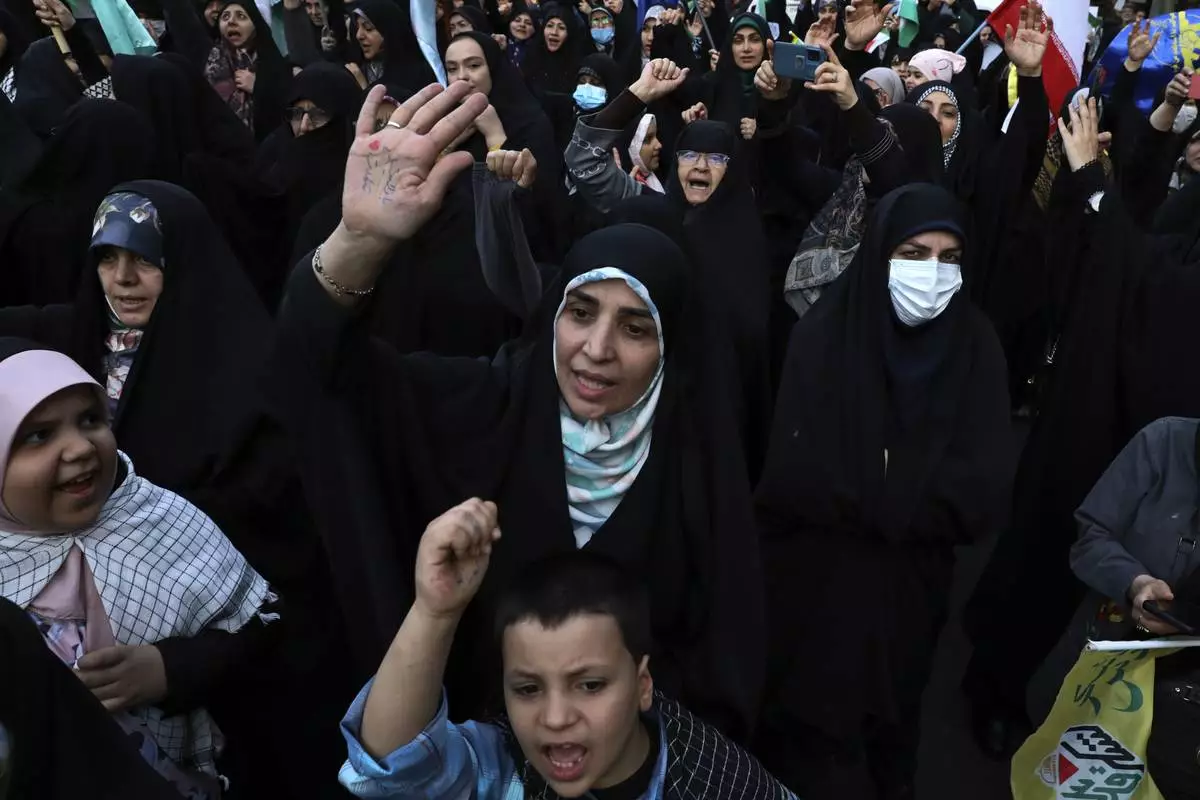
Iranian demonstrators chant slogans during a anti-Israeli gathering at the Felestin (Palestine) Sq. in Tehran, Iran, Monday, April 15, 2024. World leaders are urging Israel not to retaliate after Iran launched an attack involving hundreds of drones, ballistic missiles and cruise missiles. (AP Photo/Vahid Salemi)
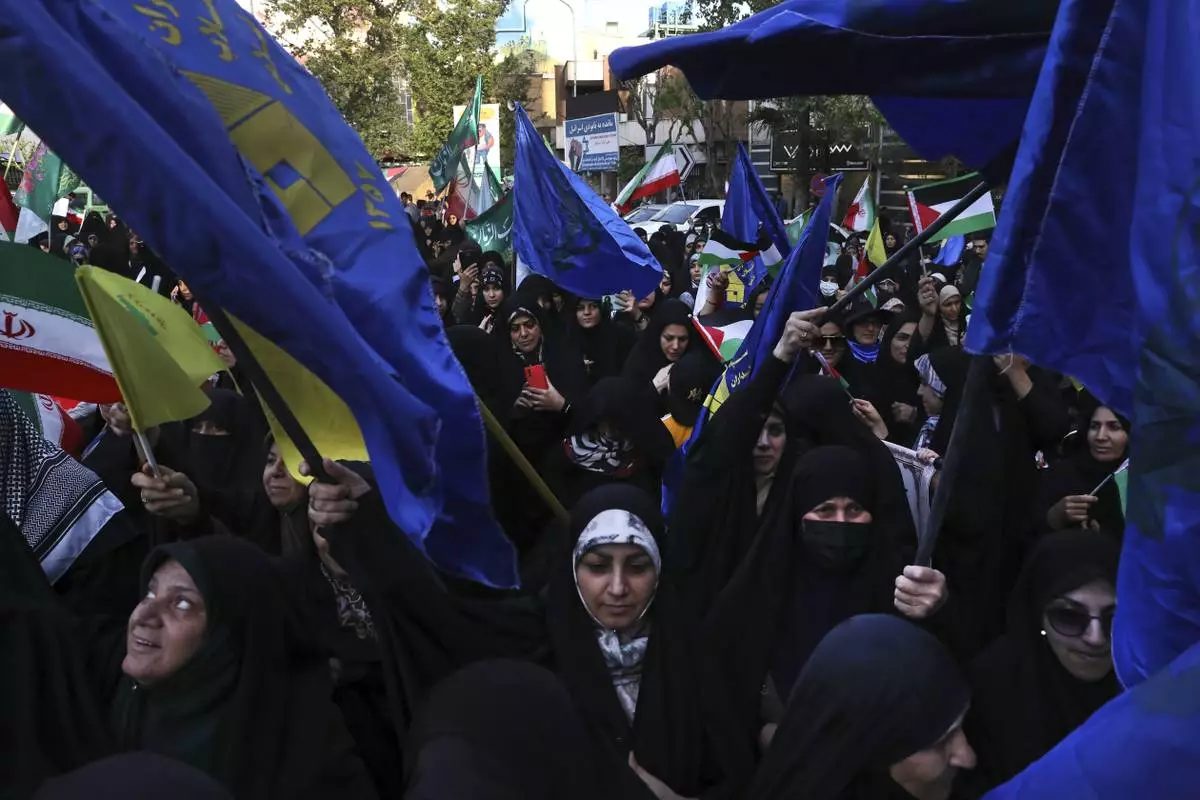
Iranian demonstrators attend an anti-Israeli gathering at the Felestin (Palestine) Sq. in Tehran, Iran, Monday, April 15, 2024. World leaders are urging Israel not to retaliate after Iran launched an attack involving hundreds of drones, ballistic missiles and cruise missiles. (AP Photo/Vahid Salemi)
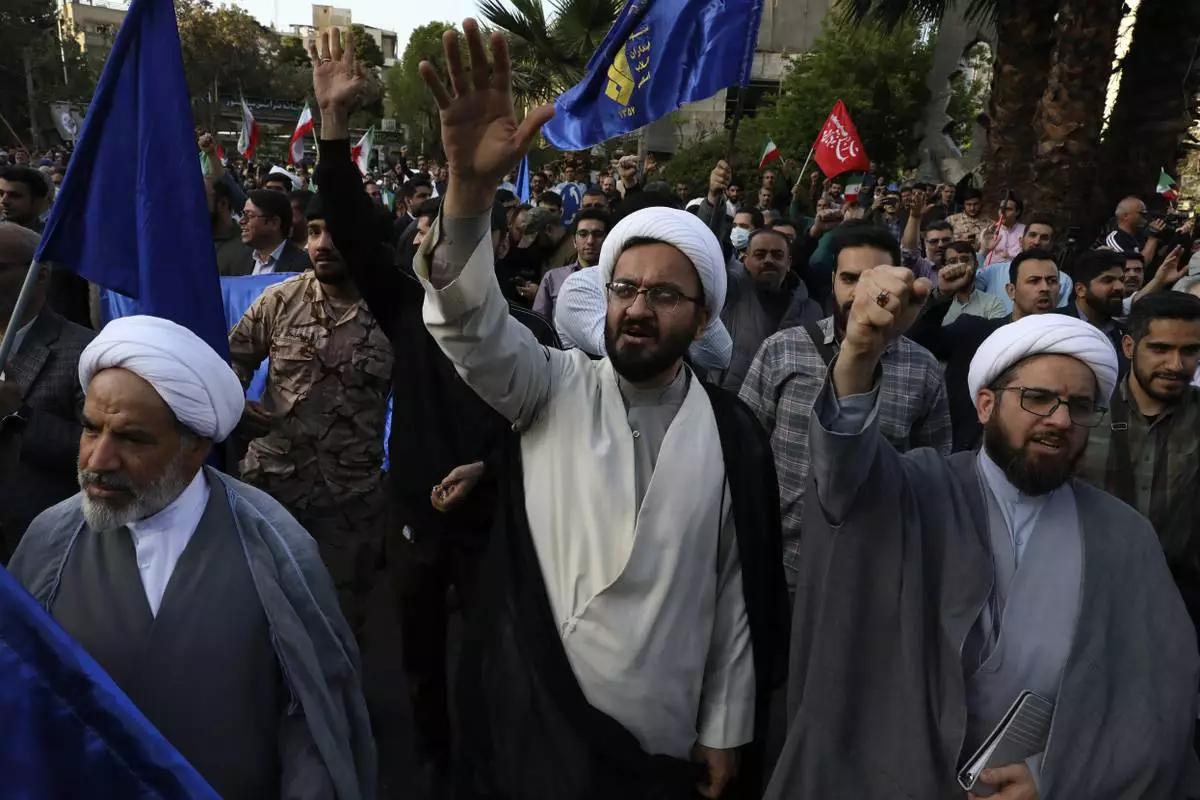
Iranian demonstrators chant slogans during their anti-Israeli gathering at the Felestin (Palestine) Sq. in Tehran, Iran, Monday, April 15, 2024. World leaders are urging Israel not to retaliate after Iran launched an attack involving hundreds of drones, ballistic missiles and cruise missiles. (AP Photo/Vahid Salemi)
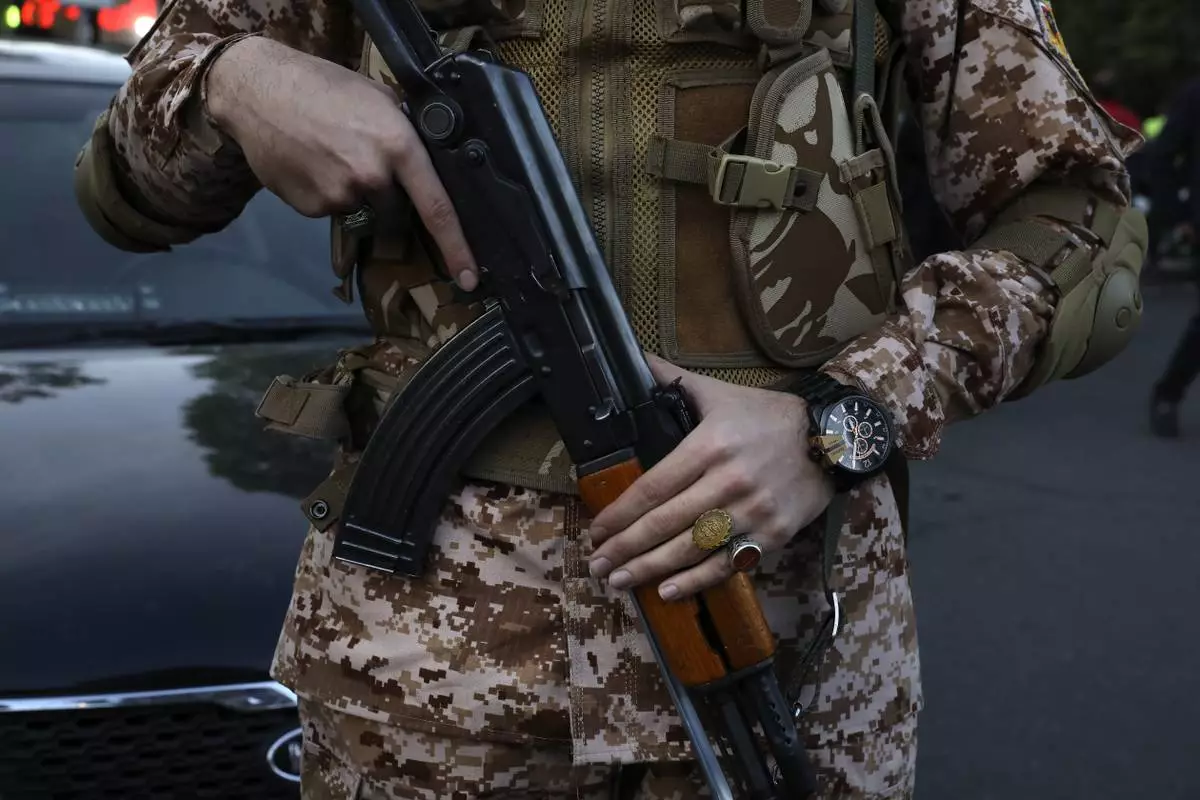
A Revolutionary Guard member stands guard during an anti-Israeli gathering at the Felestin (Palestine) Sq. in Tehran, Iran, Monday, April 15, 2024. World leaders are urging Israel not to retaliate after Iran launched an attack involving hundreds of drones, ballistic missiles and cruise missiles. (AP Photo/Vahid Salemi)
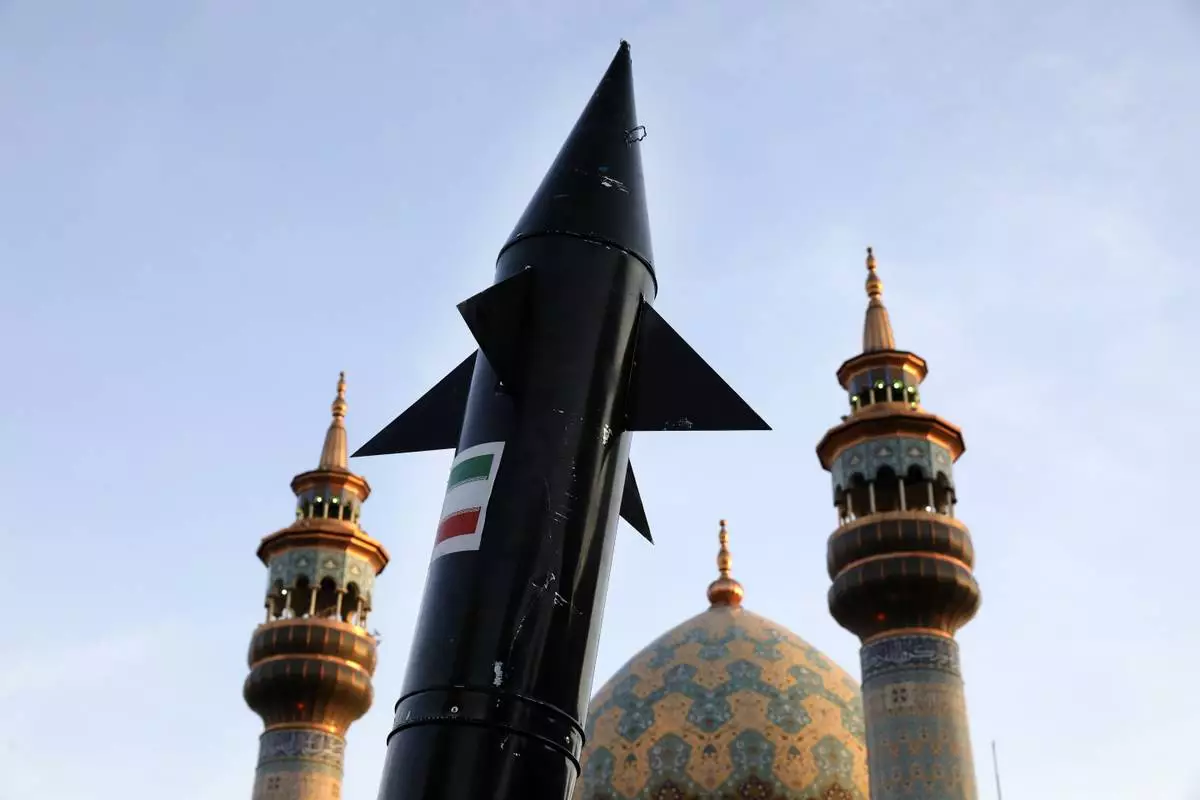
A model of a missile is carried by Iranian demonstrators as minarets and dome of a mosque is seen at background during an anti-Israeli gathering at the Felestin (Palestine) Sq. in Tehran, Iran, Monday, April 15, 2024. World leaders are urging Israel not to retaliate after Iran launched an attack involving hundreds of drones, ballistic missiles and cruise missiles. (AP Photo/Vahid Salemi)
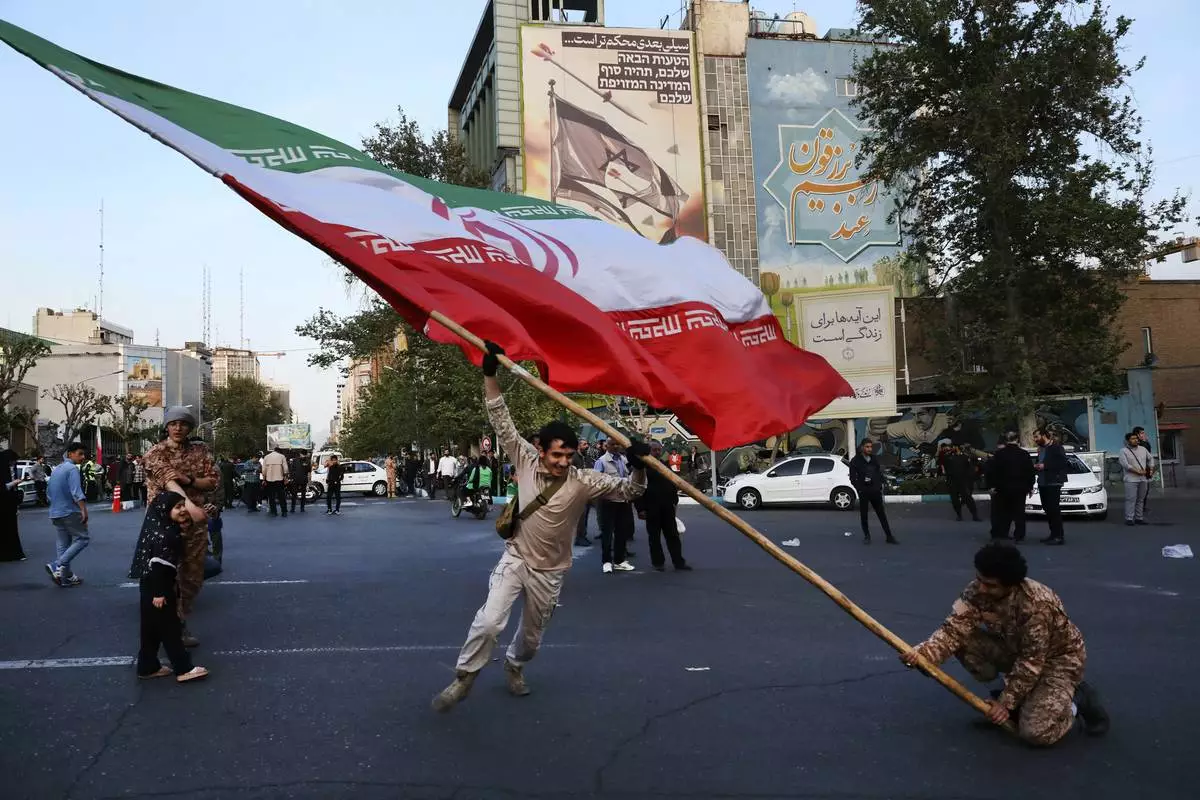
Demonstrators wave a huge Iranian flag in their anti-Israeli gathering in front of an anti-Israeli banner on the wall of a building at the Felestin (Palestine) Sq. in Tehran, Iran, Monday, April 15, 2024. World leaders are urging Israel not to retaliate after Iran launched an attack involving hundreds of drones, ballistic missiles and cruise missiles. The sign on the banner reads in Hebrew: "Your next mistake will be the end of your fake country." And the sign in Farsi reads: "The next slap will be harder." (AP Photo/Vahid Salemi)









